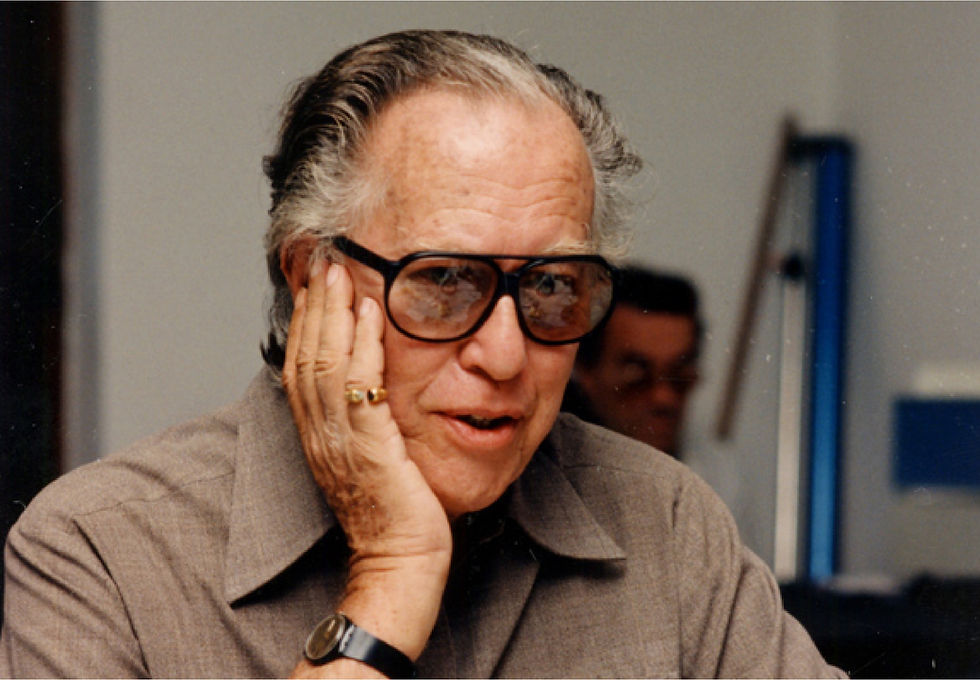Hilyard Robinson. Modernist. Black Architect.
- tipsy modernist
- Jun 18, 2021
- 3 min read

Born in Washington DC in 1899 into a working class family, Hilyard Robinson went on to become one of the most prolific architects in the mid-twentieth century. His projects included public housing, educational buildings, even airfields. In 1917 he graduated from the prestigious M street high school, the first black high school in Washington DC and continued his education at the Pennsylvania Museum and School of Industrial Arts. He left the school to fight in WW1 in the 167th Brigade of the Army Field Artillery Corps where he served as a second lieutenant in France. Influenced by the architecture f Paris,when the war ended he resumed his studies at the University of Pennsylvania for a more Beaux Arts style curriculum. However he received his BA and MA in architecture from Columbia University.

In 1931 he married Helena Rooks. Not long after, the Robinsons traveled throughout Europe on a government sponsored trip where Hilyard was engaged in photographing and documenting European refugee housing. In 1935 he began designing public housing, bringing Bauhaus style building to American public housing. He eventually became the government's lead designer of public housing. According to Docomomo( the go-to for fans of modernism) his public housing was so successful in bettering the lives of those who lived in it, that his work inspired the Roosevelt administration to pass the first National Housing Act.(1)
Langston Terrace, a large public housing development in Washington DC is his best known and clearly modernist influenced design. The dramatic and stylistic sculpture featured on the front of the building in the photo above is a depiction of the migration of black Americans from the rural south to the urban north. According to the Washington Post, Hilyard designed the housing, " to be everything that public housing often has turned out not to be: elegant architecture and landscape, state-of-the-art amenities, meticulous upkeep, lively architecture and warm, community living." (2)

While most of his projects were large government, educational or public buildings, Hilyard Robinson did design the occasional single family residence; the most notable being the Bunche home in the Brooklyn neighborhood of Washington D.C.. Designed in 1941, the house is a fascinating hybrid of modernism and traditional architecture with its lack of ornamentation and clear International Style lines, combined with a traditional pyramid hip roof. The home is now a historic landmark.


Ralphe Bunch was the first African American Nobel prize winner, the first black secretary of the United Nations and a leader in the American Civil Rights movement. He was a prominent political scientist and diplomat who played an important part in the mid- twentieth century decolonization process, receiving the Nobel Peace prize in 1950 for his 1948 mediation of the Arab-Israeli conflict.


In the forties the office of Hilyard Robinson was engaged to design numerous buildings on the campus of Howard University, where he had been a professor and chair of the architecture department. One of his biggest projects at this time was the new airfield at Tuskegee Airbase, making Hilyard Robinson the first African American to receive and fulfill a defense contract. From 1950-1955 he served on the Capitol Planning Commission and was director of the Washington Housing Association. He even consulted for the government of Liberia. By 1951he was so well-known that he was featured in an ad for Lord Calvert whiskey which ran in Ebony magazine. In 1962 he went into semi retirement. In 1984 he was made a fellow of the American Institute of Architects. He died in 1986.
On June 4, 2021, Columbia University announced a scholarship program in Hilyard Robinson's name, offering full tuition scholarships at Columbia University's summer architecture and planning programs. The scholarships are specifically aimed at introducing undergraduate student at historic black colleges to architecture and planning .
Join us in celebrating the life and work of Hilyard Robinson with a Man of Distinction cocktail.
Get the recipe here
Notes
1. Docomomo-us.org biography of Hilyard Robinson
2. Washington Post October 16, 1986 Archives "Historians Projects to Honor Architect:"
Sources
1.Wilson, Dreck Spurlock, edit. African American Architects A Biographical Dictionary, , Routledge, New York New York 2004 2. Wilson, Kristina. Mid-century Modernism and the American Body:Race, Gender, and the Politics of Power in Design Princeton University Press 2021








Comments